WELF 3023 Organisational Study: Asylum Seeker Detention and Ethics
VerifiedAdded on 2022/11/09
|9
|2485
|156
Report
AI Summary
This report provides an organizational study of asylum seeker detention, focusing on ethical issues and the application of AASW Practice Standards (2013). The report analyzes the detention centers through a political frame, drawing on Briskman et al.'s (2012) account to illustrate the context of the Australian Migration Act 1958 and the Universal Declaration of Human Rights (1948). The report explores the relevance of specific AASW standards, contrasting the views of different workers, and discussing the importance of ethical decision-making, diversity, and compliance within the organization. It also examines the impact of workplace culture, diversity, and the challenges faced by asylum seekers, particularly regarding access to social work services and decision-making opportunities. The report emphasizes the need for social workers to adhere to ethical principles, maintain independence, and promote the well-being of both the recipients of services and the workers within the organization. Finally, it provides a comprehensive analysis of ethical issues related to the detention of asylum seekers, highlighting the need for ethical considerations in the social work practice.
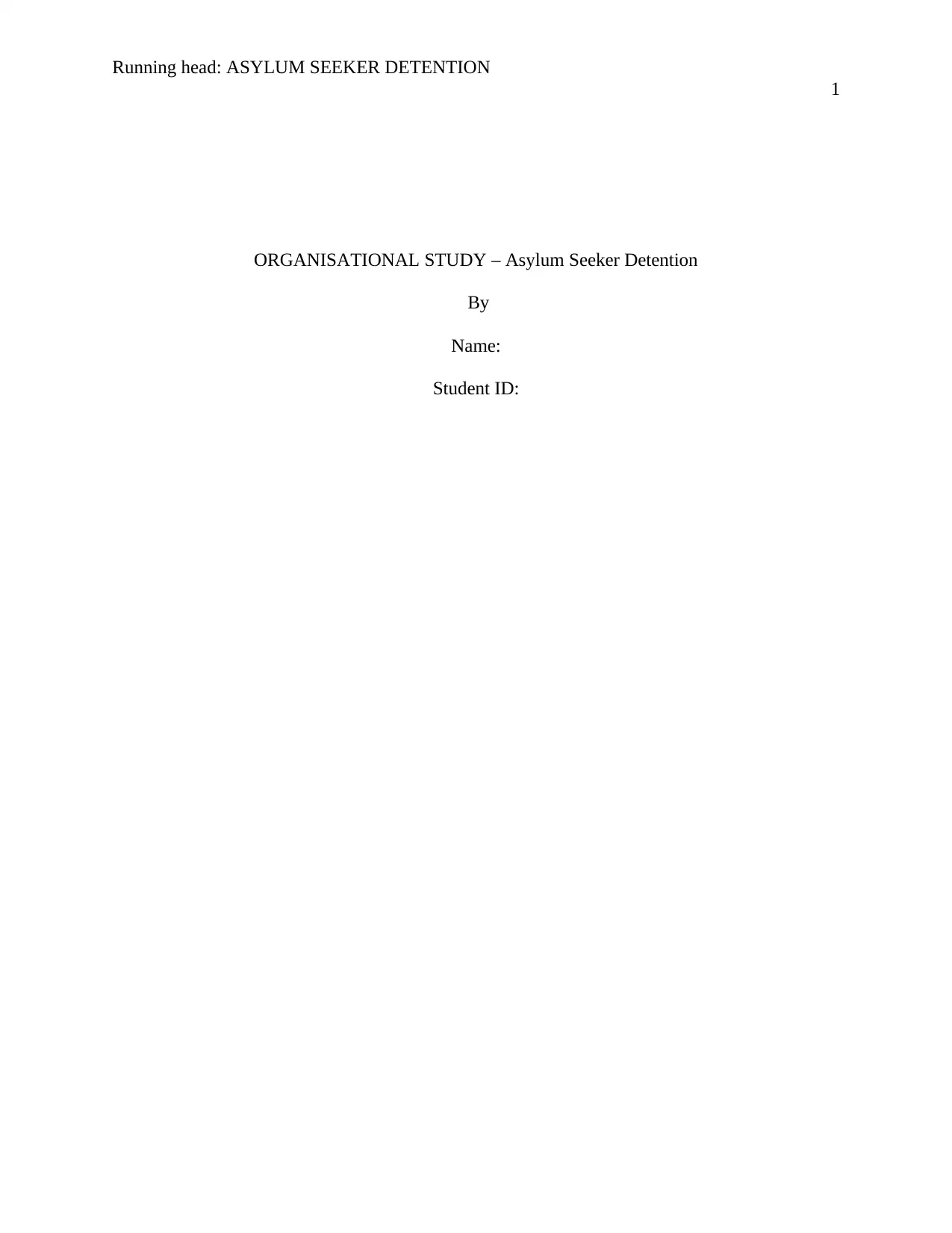
Running head: ASYLUM SEEKER DETENTION
1
ORGANISATIONAL STUDY – Asylum Seeker Detention
By
Name:
Student ID:
1
ORGANISATIONAL STUDY – Asylum Seeker Detention
By
Name:
Student ID:
Paraphrase This Document
Need a fresh take? Get an instant paraphrase of this document with our AI Paraphraser
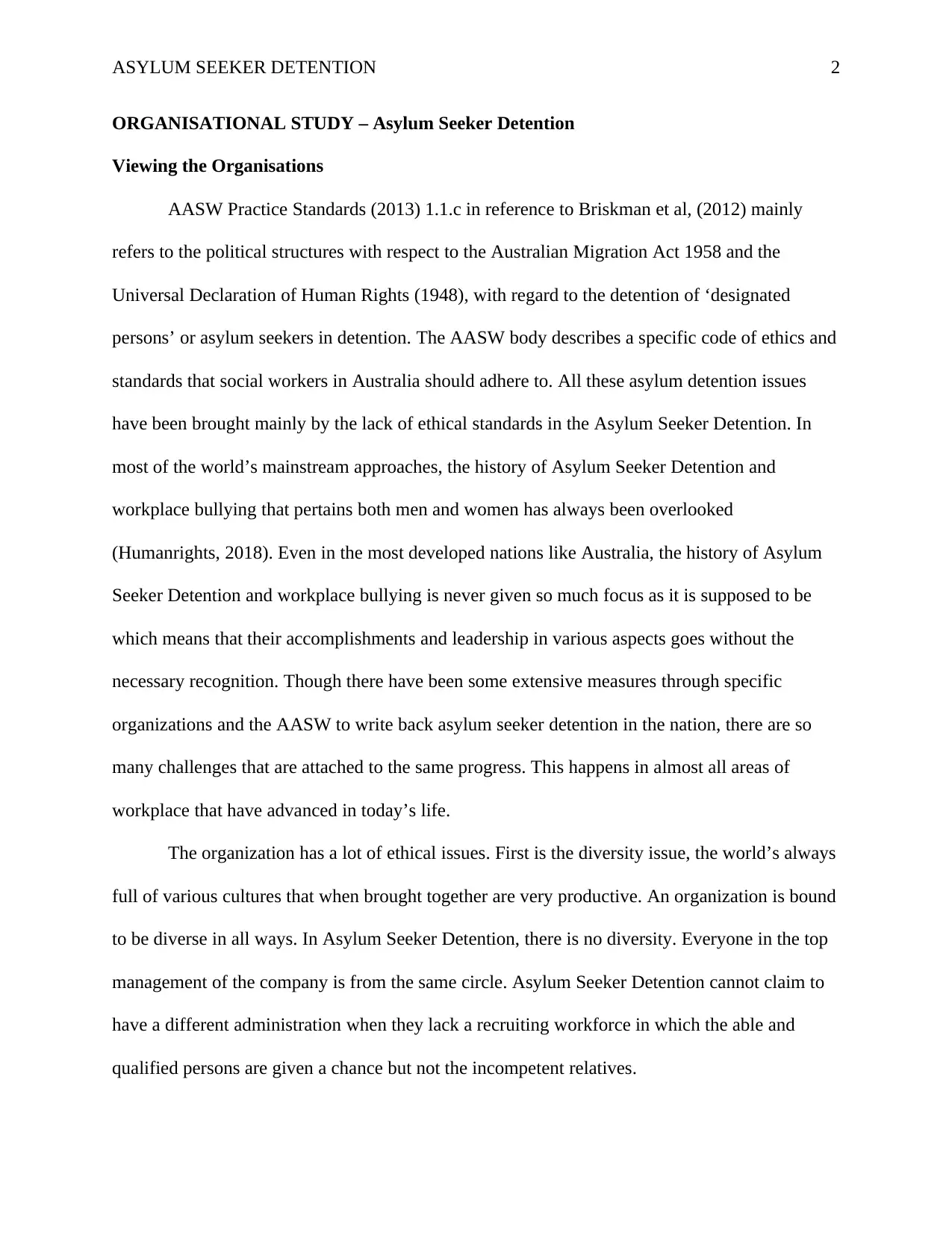
ASYLUM SEEKER DETENTION 2
ORGANISATIONAL STUDY – Asylum Seeker Detention
Viewing the Organisations
AASW Practice Standards (2013) 1.1.c in reference to Briskman et al, (2012) mainly
refers to the political structures with respect to the Australian Migration Act 1958 and the
Universal Declaration of Human Rights (1948), with regard to the detention of ‘designated
persons’ or asylum seekers in detention. The AASW body describes a specific code of ethics and
standards that social workers in Australia should adhere to. All these asylum detention issues
have been brought mainly by the lack of ethical standards in the Asylum Seeker Detention. In
most of the world’s mainstream approaches, the history of Asylum Seeker Detention and
workplace bullying that pertains both men and women has always been overlooked
(Humanrights, 2018). Even in the most developed nations like Australia, the history of Asylum
Seeker Detention and workplace bullying is never given so much focus as it is supposed to be
which means that their accomplishments and leadership in various aspects goes without the
necessary recognition. Though there have been some extensive measures through specific
organizations and the AASW to write back asylum seeker detention in the nation, there are so
many challenges that are attached to the same progress. This happens in almost all areas of
workplace that have advanced in today’s life.
The organization has a lot of ethical issues. First is the diversity issue, the world’s always
full of various cultures that when brought together are very productive. An organization is bound
to be diverse in all ways. In Asylum Seeker Detention, there is no diversity. Everyone in the top
management of the company is from the same circle. Asylum Seeker Detention cannot claim to
have a different administration when they lack a recruiting workforce in which the able and
qualified persons are given a chance but not the incompetent relatives.
ORGANISATIONAL STUDY – Asylum Seeker Detention
Viewing the Organisations
AASW Practice Standards (2013) 1.1.c in reference to Briskman et al, (2012) mainly
refers to the political structures with respect to the Australian Migration Act 1958 and the
Universal Declaration of Human Rights (1948), with regard to the detention of ‘designated
persons’ or asylum seekers in detention. The AASW body describes a specific code of ethics and
standards that social workers in Australia should adhere to. All these asylum detention issues
have been brought mainly by the lack of ethical standards in the Asylum Seeker Detention. In
most of the world’s mainstream approaches, the history of Asylum Seeker Detention and
workplace bullying that pertains both men and women has always been overlooked
(Humanrights, 2018). Even in the most developed nations like Australia, the history of Asylum
Seeker Detention and workplace bullying is never given so much focus as it is supposed to be
which means that their accomplishments and leadership in various aspects goes without the
necessary recognition. Though there have been some extensive measures through specific
organizations and the AASW to write back asylum seeker detention in the nation, there are so
many challenges that are attached to the same progress. This happens in almost all areas of
workplace that have advanced in today’s life.
The organization has a lot of ethical issues. First is the diversity issue, the world’s always
full of various cultures that when brought together are very productive. An organization is bound
to be diverse in all ways. In Asylum Seeker Detention, there is no diversity. Everyone in the top
management of the company is from the same circle. Asylum Seeker Detention cannot claim to
have a different administration when they lack a recruiting workforce in which the able and
qualified persons are given a chance but not the incompetent relatives.
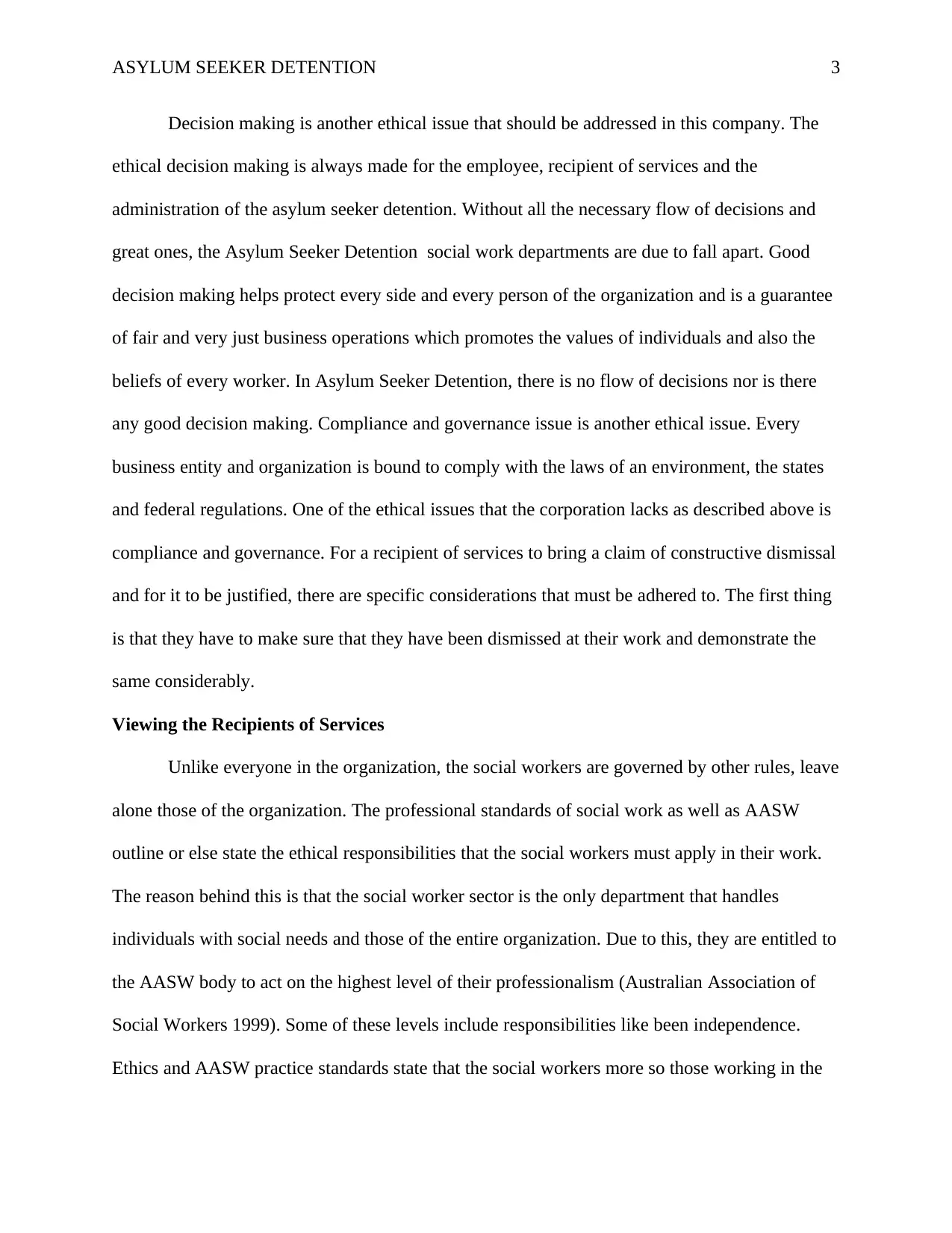
ASYLUM SEEKER DETENTION 3
Decision making is another ethical issue that should be addressed in this company. The
ethical decision making is always made for the employee, recipient of services and the
administration of the asylum seeker detention. Without all the necessary flow of decisions and
great ones, the Asylum Seeker Detention social work departments are due to fall apart. Good
decision making helps protect every side and every person of the organization and is a guarantee
of fair and very just business operations which promotes the values of individuals and also the
beliefs of every worker. In Asylum Seeker Detention, there is no flow of decisions nor is there
any good decision making. Compliance and governance issue is another ethical issue. Every
business entity and organization is bound to comply with the laws of an environment, the states
and federal regulations. One of the ethical issues that the corporation lacks as described above is
compliance and governance. For a recipient of services to bring a claim of constructive dismissal
and for it to be justified, there are specific considerations that must be adhered to. The first thing
is that they have to make sure that they have been dismissed at their work and demonstrate the
same considerably.
Viewing the Recipients of Services
Unlike everyone in the organization, the social workers are governed by other rules, leave
alone those of the organization. The professional standards of social work as well as AASW
outline or else state the ethical responsibilities that the social workers must apply in their work.
The reason behind this is that the social worker sector is the only department that handles
individuals with social needs and those of the entire organization. Due to this, they are entitled to
the AASW body to act on the highest level of their professionalism (Australian Association of
Social Workers 1999). Some of these levels include responsibilities like been independence.
Ethics and AASW practice standards state that the social workers more so those working in the
Decision making is another ethical issue that should be addressed in this company. The
ethical decision making is always made for the employee, recipient of services and the
administration of the asylum seeker detention. Without all the necessary flow of decisions and
great ones, the Asylum Seeker Detention social work departments are due to fall apart. Good
decision making helps protect every side and every person of the organization and is a guarantee
of fair and very just business operations which promotes the values of individuals and also the
beliefs of every worker. In Asylum Seeker Detention, there is no flow of decisions nor is there
any good decision making. Compliance and governance issue is another ethical issue. Every
business entity and organization is bound to comply with the laws of an environment, the states
and federal regulations. One of the ethical issues that the corporation lacks as described above is
compliance and governance. For a recipient of services to bring a claim of constructive dismissal
and for it to be justified, there are specific considerations that must be adhered to. The first thing
is that they have to make sure that they have been dismissed at their work and demonstrate the
same considerably.
Viewing the Recipients of Services
Unlike everyone in the organization, the social workers are governed by other rules, leave
alone those of the organization. The professional standards of social work as well as AASW
outline or else state the ethical responsibilities that the social workers must apply in their work.
The reason behind this is that the social worker sector is the only department that handles
individuals with social needs and those of the entire organization. Due to this, they are entitled to
the AASW body to act on the highest level of their professionalism (Australian Association of
Social Workers 1999). Some of these levels include responsibilities like been independence.
Ethics and AASW practice standards state that the social workers more so those working in the
⊘ This is a preview!⊘
Do you want full access?
Subscribe today to unlock all pages.

Trusted by 1+ million students worldwide
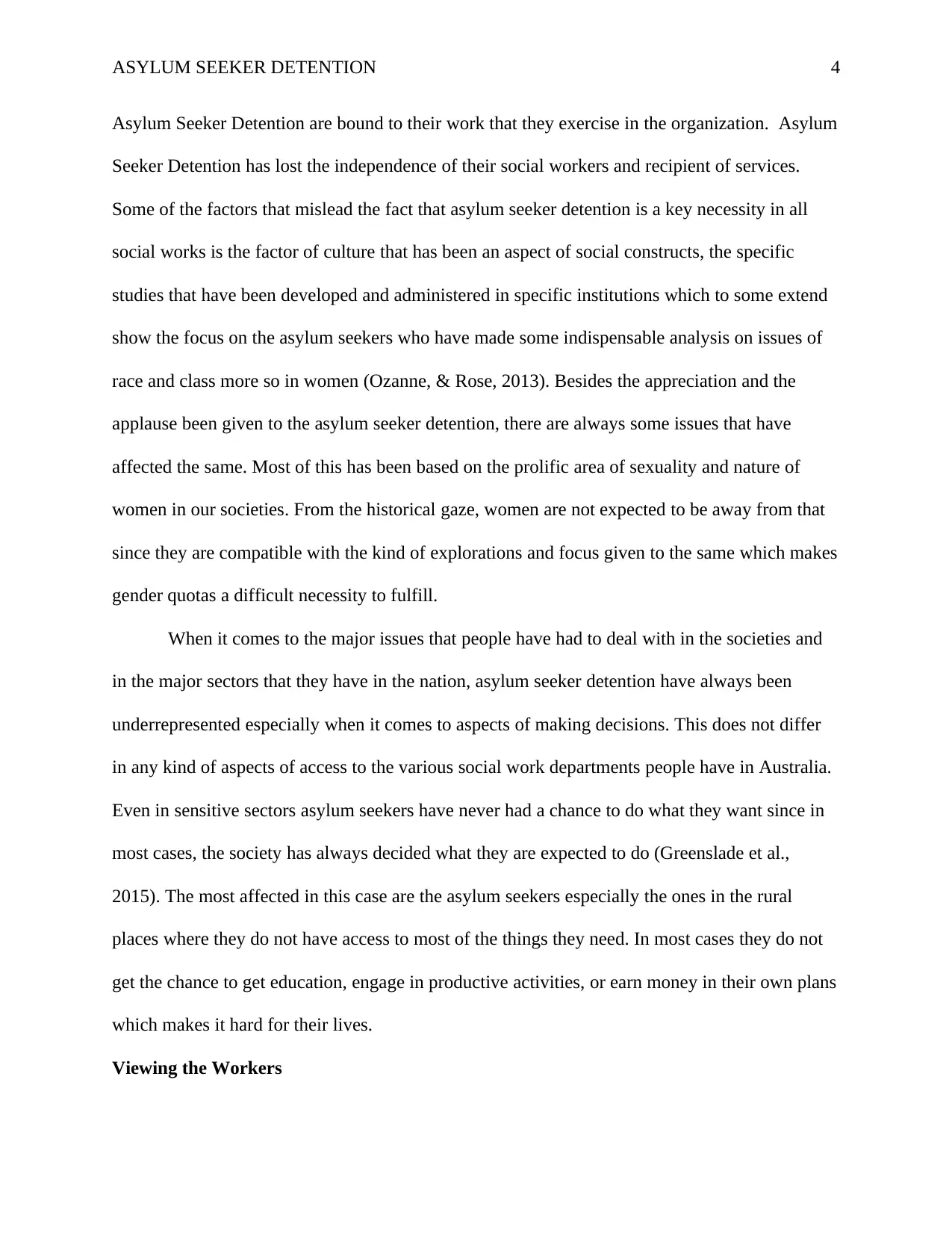
ASYLUM SEEKER DETENTION 4
Asylum Seeker Detention are bound to their work that they exercise in the organization. Asylum
Seeker Detention has lost the independence of their social workers and recipient of services.
Some of the factors that mislead the fact that asylum seeker detention is a key necessity in all
social works is the factor of culture that has been an aspect of social constructs, the specific
studies that have been developed and administered in specific institutions which to some extend
show the focus on the asylum seekers who have made some indispensable analysis on issues of
race and class more so in women (Ozanne, & Rose, 2013). Besides the appreciation and the
applause been given to the asylum seeker detention, there are always some issues that have
affected the same. Most of this has been based on the prolific area of sexuality and nature of
women in our societies. From the historical gaze, women are not expected to be away from that
since they are compatible with the kind of explorations and focus given to the same which makes
gender quotas a difficult necessity to fulfill.
When it comes to the major issues that people have had to deal with in the societies and
in the major sectors that they have in the nation, asylum seeker detention have always been
underrepresented especially when it comes to aspects of making decisions. This does not differ
in any kind of aspects of access to the various social work departments people have in Australia.
Even in sensitive sectors asylum seekers have never had a chance to do what they want since in
most cases, the society has always decided what they are expected to do (Greenslade et al.,
2015). The most affected in this case are the asylum seekers especially the ones in the rural
places where they do not have access to most of the things they need. In most cases they do not
get the chance to get education, engage in productive activities, or earn money in their own plans
which makes it hard for their lives.
Viewing the Workers
Asylum Seeker Detention are bound to their work that they exercise in the organization. Asylum
Seeker Detention has lost the independence of their social workers and recipient of services.
Some of the factors that mislead the fact that asylum seeker detention is a key necessity in all
social works is the factor of culture that has been an aspect of social constructs, the specific
studies that have been developed and administered in specific institutions which to some extend
show the focus on the asylum seekers who have made some indispensable analysis on issues of
race and class more so in women (Ozanne, & Rose, 2013). Besides the appreciation and the
applause been given to the asylum seeker detention, there are always some issues that have
affected the same. Most of this has been based on the prolific area of sexuality and nature of
women in our societies. From the historical gaze, women are not expected to be away from that
since they are compatible with the kind of explorations and focus given to the same which makes
gender quotas a difficult necessity to fulfill.
When it comes to the major issues that people have had to deal with in the societies and
in the major sectors that they have in the nation, asylum seeker detention have always been
underrepresented especially when it comes to aspects of making decisions. This does not differ
in any kind of aspects of access to the various social work departments people have in Australia.
Even in sensitive sectors asylum seekers have never had a chance to do what they want since in
most cases, the society has always decided what they are expected to do (Greenslade et al.,
2015). The most affected in this case are the asylum seekers especially the ones in the rural
places where they do not have access to most of the things they need. In most cases they do not
get the chance to get education, engage in productive activities, or earn money in their own plans
which makes it hard for their lives.
Viewing the Workers
Paraphrase This Document
Need a fresh take? Get an instant paraphrase of this document with our AI Paraphraser
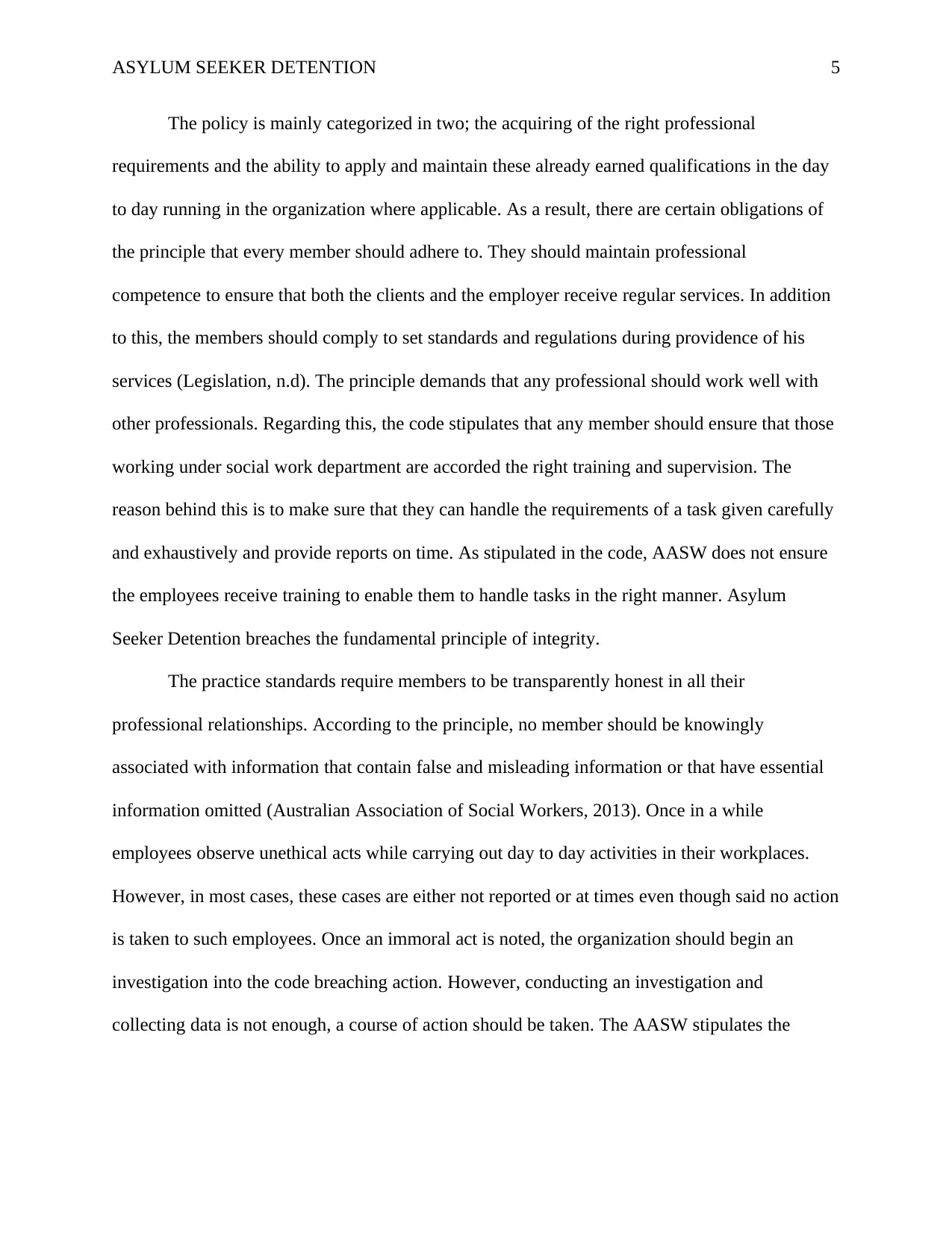
ASYLUM SEEKER DETENTION 5
The policy is mainly categorized in two; the acquiring of the right professional
requirements and the ability to apply and maintain these already earned qualifications in the day
to day running in the organization where applicable. As a result, there are certain obligations of
the principle that every member should adhere to. They should maintain professional
competence to ensure that both the clients and the employer receive regular services. In addition
to this, the members should comply to set standards and regulations during providence of his
services (Legislation, n.d). The principle demands that any professional should work well with
other professionals. Regarding this, the code stipulates that any member should ensure that those
working under social work department are accorded the right training and supervision. The
reason behind this is to make sure that they can handle the requirements of a task given carefully
and exhaustively and provide reports on time. As stipulated in the code, AASW does not ensure
the employees receive training to enable them to handle tasks in the right manner. Asylum
Seeker Detention breaches the fundamental principle of integrity.
The practice standards require members to be transparently honest in all their
professional relationships. According to the principle, no member should be knowingly
associated with information that contain false and misleading information or that have essential
information omitted (Australian Association of Social Workers, 2013). Once in a while
employees observe unethical acts while carrying out day to day activities in their workplaces.
However, in most cases, these cases are either not reported or at times even though said no action
is taken to such employees. Once an immoral act is noted, the organization should begin an
investigation into the code breaching action. However, conducting an investigation and
collecting data is not enough, a course of action should be taken. The AASW stipulates the
The policy is mainly categorized in two; the acquiring of the right professional
requirements and the ability to apply and maintain these already earned qualifications in the day
to day running in the organization where applicable. As a result, there are certain obligations of
the principle that every member should adhere to. They should maintain professional
competence to ensure that both the clients and the employer receive regular services. In addition
to this, the members should comply to set standards and regulations during providence of his
services (Legislation, n.d). The principle demands that any professional should work well with
other professionals. Regarding this, the code stipulates that any member should ensure that those
working under social work department are accorded the right training and supervision. The
reason behind this is to make sure that they can handle the requirements of a task given carefully
and exhaustively and provide reports on time. As stipulated in the code, AASW does not ensure
the employees receive training to enable them to handle tasks in the right manner. Asylum
Seeker Detention breaches the fundamental principle of integrity.
The practice standards require members to be transparently honest in all their
professional relationships. According to the principle, no member should be knowingly
associated with information that contain false and misleading information or that have essential
information omitted (Australian Association of Social Workers, 2013). Once in a while
employees observe unethical acts while carrying out day to day activities in their workplaces.
However, in most cases, these cases are either not reported or at times even though said no action
is taken to such employees. Once an immoral act is noted, the organization should begin an
investigation into the code breaching action. However, conducting an investigation and
collecting data is not enough, a course of action should be taken. The AASW stipulates the
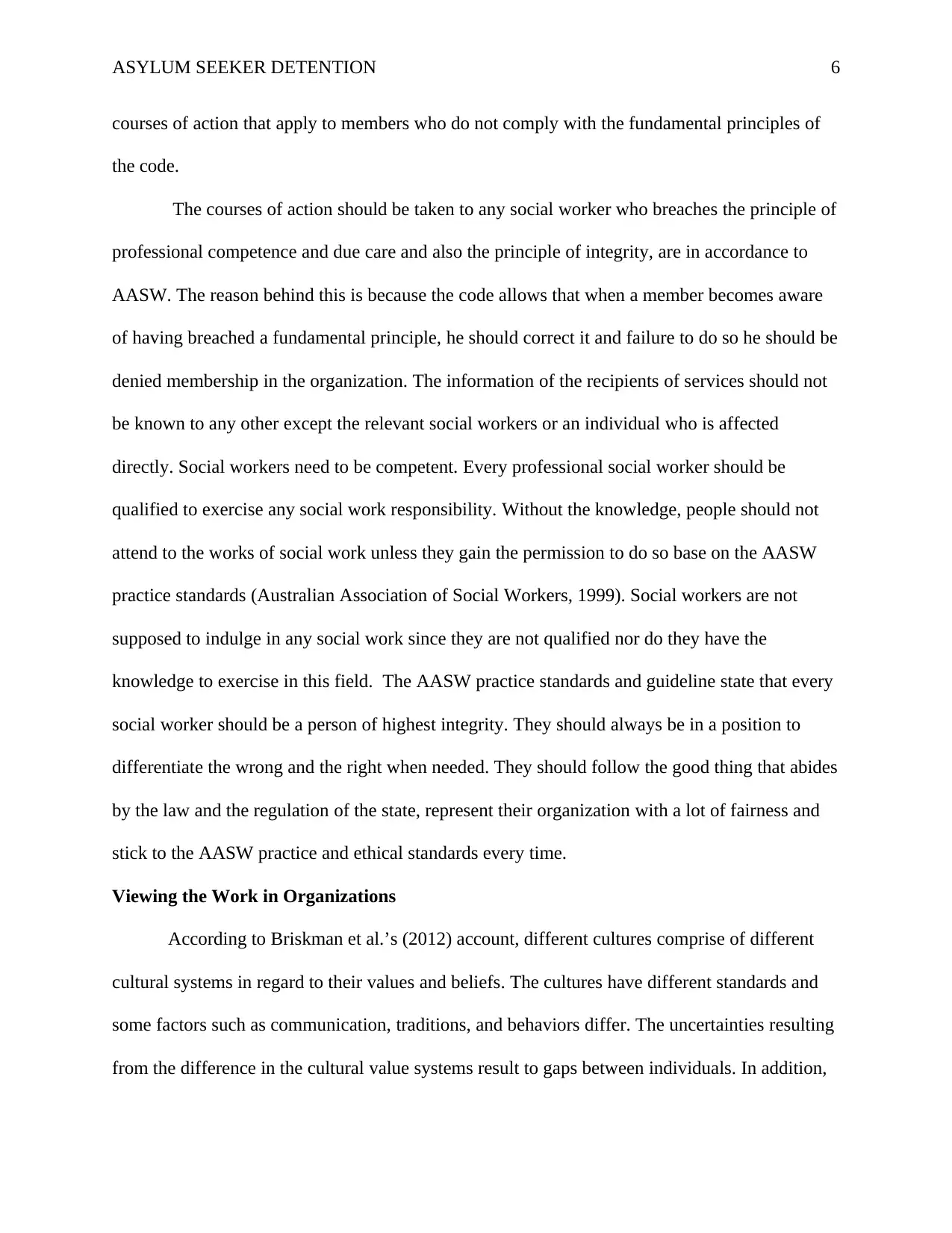
ASYLUM SEEKER DETENTION 6
courses of action that apply to members who do not comply with the fundamental principles of
the code.
The courses of action should be taken to any social worker who breaches the principle of
professional competence and due care and also the principle of integrity, are in accordance to
AASW. The reason behind this is because the code allows that when a member becomes aware
of having breached a fundamental principle, he should correct it and failure to do so he should be
denied membership in the organization. The information of the recipients of services should not
be known to any other except the relevant social workers or an individual who is affected
directly. Social workers need to be competent. Every professional social worker should be
qualified to exercise any social work responsibility. Without the knowledge, people should not
attend to the works of social work unless they gain the permission to do so base on the AASW
practice standards (Australian Association of Social Workers, 1999). Social workers are not
supposed to indulge in any social work since they are not qualified nor do they have the
knowledge to exercise in this field. The AASW practice standards and guideline state that every
social worker should be a person of highest integrity. They should always be in a position to
differentiate the wrong and the right when needed. They should follow the good thing that abides
by the law and the regulation of the state, represent their organization with a lot of fairness and
stick to the AASW practice and ethical standards every time.
Viewing the Work in Organizations
According to Briskman et al.’s (2012) account, different cultures comprise of different
cultural systems in regard to their values and beliefs. The cultures have different standards and
some factors such as communication, traditions, and behaviors differ. The uncertainties resulting
from the difference in the cultural value systems result to gaps between individuals. In addition,
courses of action that apply to members who do not comply with the fundamental principles of
the code.
The courses of action should be taken to any social worker who breaches the principle of
professional competence and due care and also the principle of integrity, are in accordance to
AASW. The reason behind this is because the code allows that when a member becomes aware
of having breached a fundamental principle, he should correct it and failure to do so he should be
denied membership in the organization. The information of the recipients of services should not
be known to any other except the relevant social workers or an individual who is affected
directly. Social workers need to be competent. Every professional social worker should be
qualified to exercise any social work responsibility. Without the knowledge, people should not
attend to the works of social work unless they gain the permission to do so base on the AASW
practice standards (Australian Association of Social Workers, 1999). Social workers are not
supposed to indulge in any social work since they are not qualified nor do they have the
knowledge to exercise in this field. The AASW practice standards and guideline state that every
social worker should be a person of highest integrity. They should always be in a position to
differentiate the wrong and the right when needed. They should follow the good thing that abides
by the law and the regulation of the state, represent their organization with a lot of fairness and
stick to the AASW practice and ethical standards every time.
Viewing the Work in Organizations
According to Briskman et al.’s (2012) account, different cultures comprise of different
cultural systems in regard to their values and beliefs. The cultures have different standards and
some factors such as communication, traditions, and behaviors differ. The uncertainties resulting
from the difference in the cultural value systems result to gaps between individuals. In addition,
⊘ This is a preview!⊘
Do you want full access?
Subscribe today to unlock all pages.

Trusted by 1+ million students worldwide
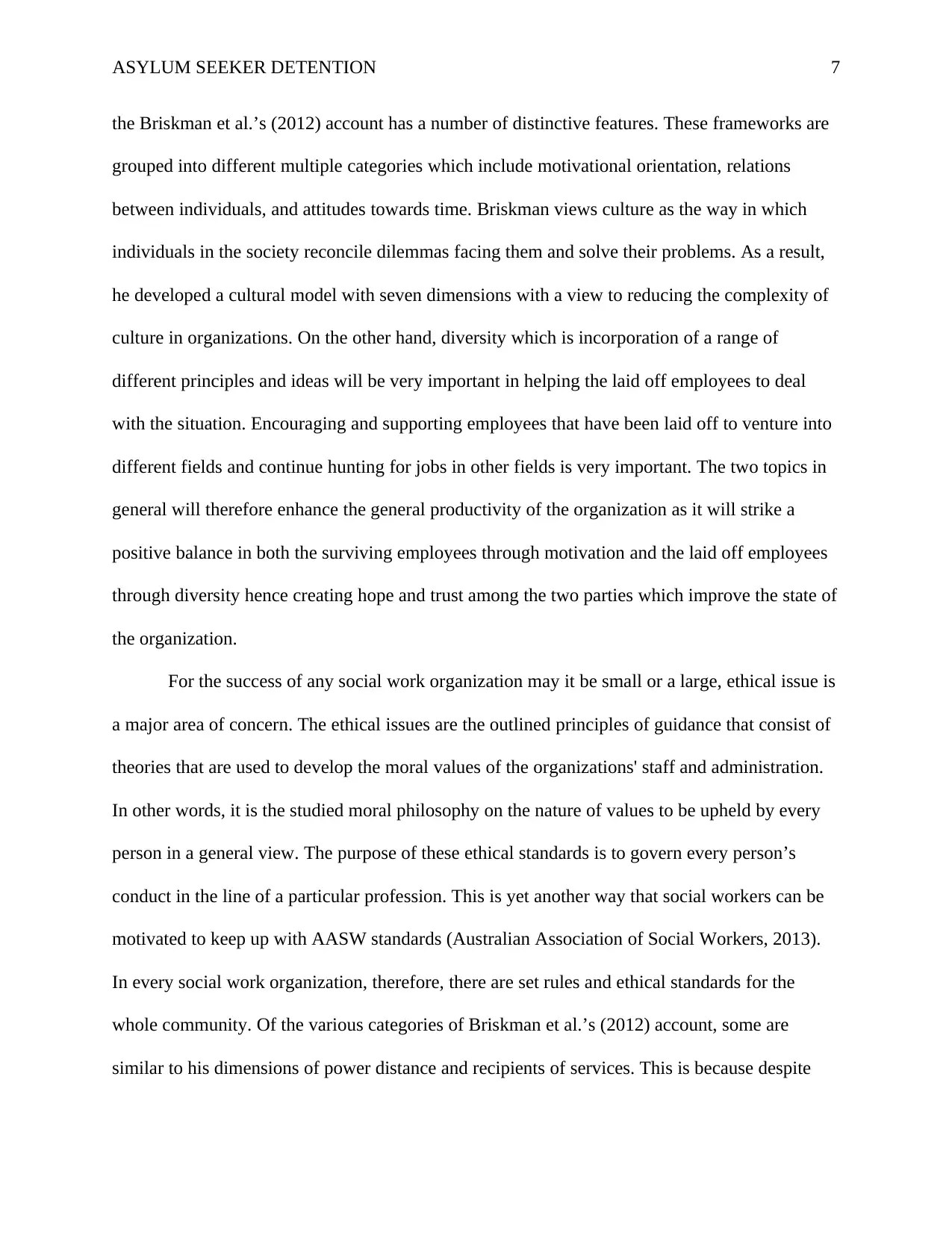
ASYLUM SEEKER DETENTION 7
the Briskman et al.’s (2012) account has a number of distinctive features. These frameworks are
grouped into different multiple categories which include motivational orientation, relations
between individuals, and attitudes towards time. Briskman views culture as the way in which
individuals in the society reconcile dilemmas facing them and solve their problems. As a result,
he developed a cultural model with seven dimensions with a view to reducing the complexity of
culture in organizations. On the other hand, diversity which is incorporation of a range of
different principles and ideas will be very important in helping the laid off employees to deal
with the situation. Encouraging and supporting employees that have been laid off to venture into
different fields and continue hunting for jobs in other fields is very important. The two topics in
general will therefore enhance the general productivity of the organization as it will strike a
positive balance in both the surviving employees through motivation and the laid off employees
through diversity hence creating hope and trust among the two parties which improve the state of
the organization.
For the success of any social work organization may it be small or a large, ethical issue is
a major area of concern. The ethical issues are the outlined principles of guidance that consist of
theories that are used to develop the moral values of the organizations' staff and administration.
In other words, it is the studied moral philosophy on the nature of values to be upheld by every
person in a general view. The purpose of these ethical standards is to govern every person’s
conduct in the line of a particular profession. This is yet another way that social workers can be
motivated to keep up with AASW standards (Australian Association of Social Workers, 2013).
In every social work organization, therefore, there are set rules and ethical standards for the
whole community. Of the various categories of Briskman et al.’s (2012) account, some are
similar to his dimensions of power distance and recipients of services. This is because despite
the Briskman et al.’s (2012) account has a number of distinctive features. These frameworks are
grouped into different multiple categories which include motivational orientation, relations
between individuals, and attitudes towards time. Briskman views culture as the way in which
individuals in the society reconcile dilemmas facing them and solve their problems. As a result,
he developed a cultural model with seven dimensions with a view to reducing the complexity of
culture in organizations. On the other hand, diversity which is incorporation of a range of
different principles and ideas will be very important in helping the laid off employees to deal
with the situation. Encouraging and supporting employees that have been laid off to venture into
different fields and continue hunting for jobs in other fields is very important. The two topics in
general will therefore enhance the general productivity of the organization as it will strike a
positive balance in both the surviving employees through motivation and the laid off employees
through diversity hence creating hope and trust among the two parties which improve the state of
the organization.
For the success of any social work organization may it be small or a large, ethical issue is
a major area of concern. The ethical issues are the outlined principles of guidance that consist of
theories that are used to develop the moral values of the organizations' staff and administration.
In other words, it is the studied moral philosophy on the nature of values to be upheld by every
person in a general view. The purpose of these ethical standards is to govern every person’s
conduct in the line of a particular profession. This is yet another way that social workers can be
motivated to keep up with AASW standards (Australian Association of Social Workers, 2013).
In every social work organization, therefore, there are set rules and ethical standards for the
whole community. Of the various categories of Briskman et al.’s (2012) account, some are
similar to his dimensions of power distance and recipients of services. This is because despite
Paraphrase This Document
Need a fresh take? Get an instant paraphrase of this document with our AI Paraphraser
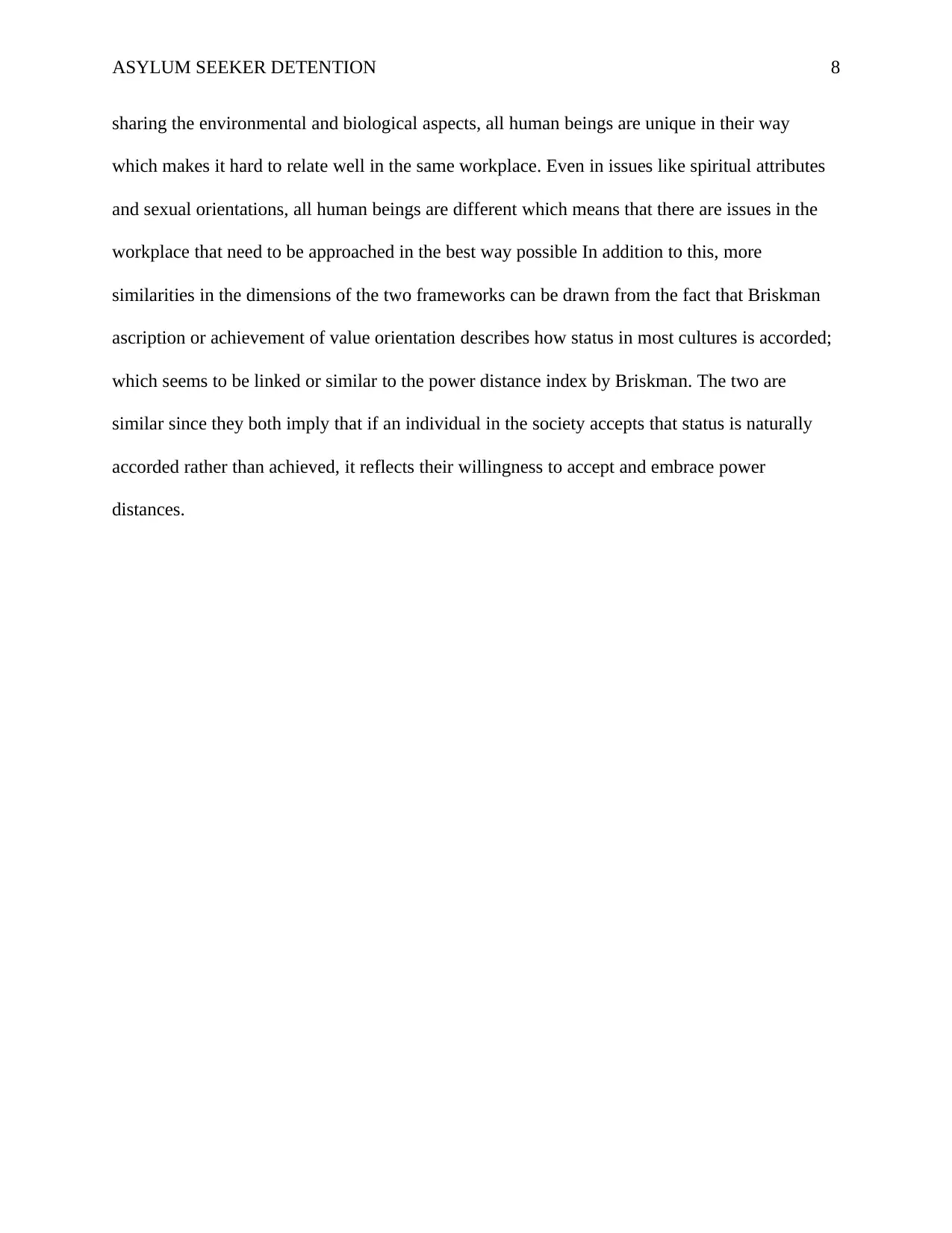
ASYLUM SEEKER DETENTION 8
sharing the environmental and biological aspects, all human beings are unique in their way
which makes it hard to relate well in the same workplace. Even in issues like spiritual attributes
and sexual orientations, all human beings are different which means that there are issues in the
workplace that need to be approached in the best way possible In addition to this, more
similarities in the dimensions of the two frameworks can be drawn from the fact that Briskman
ascription or achievement of value orientation describes how status in most cultures is accorded;
which seems to be linked or similar to the power distance index by Briskman. The two are
similar since they both imply that if an individual in the society accepts that status is naturally
accorded rather than achieved, it reflects their willingness to accept and embrace power
distances.
sharing the environmental and biological aspects, all human beings are unique in their way
which makes it hard to relate well in the same workplace. Even in issues like spiritual attributes
and sexual orientations, all human beings are different which means that there are issues in the
workplace that need to be approached in the best way possible In addition to this, more
similarities in the dimensions of the two frameworks can be drawn from the fact that Briskman
ascription or achievement of value orientation describes how status in most cultures is accorded;
which seems to be linked or similar to the power distance index by Briskman. The two are
similar since they both imply that if an individual in the society accepts that status is naturally
accorded rather than achieved, it reflects their willingness to accept and embrace power
distances.
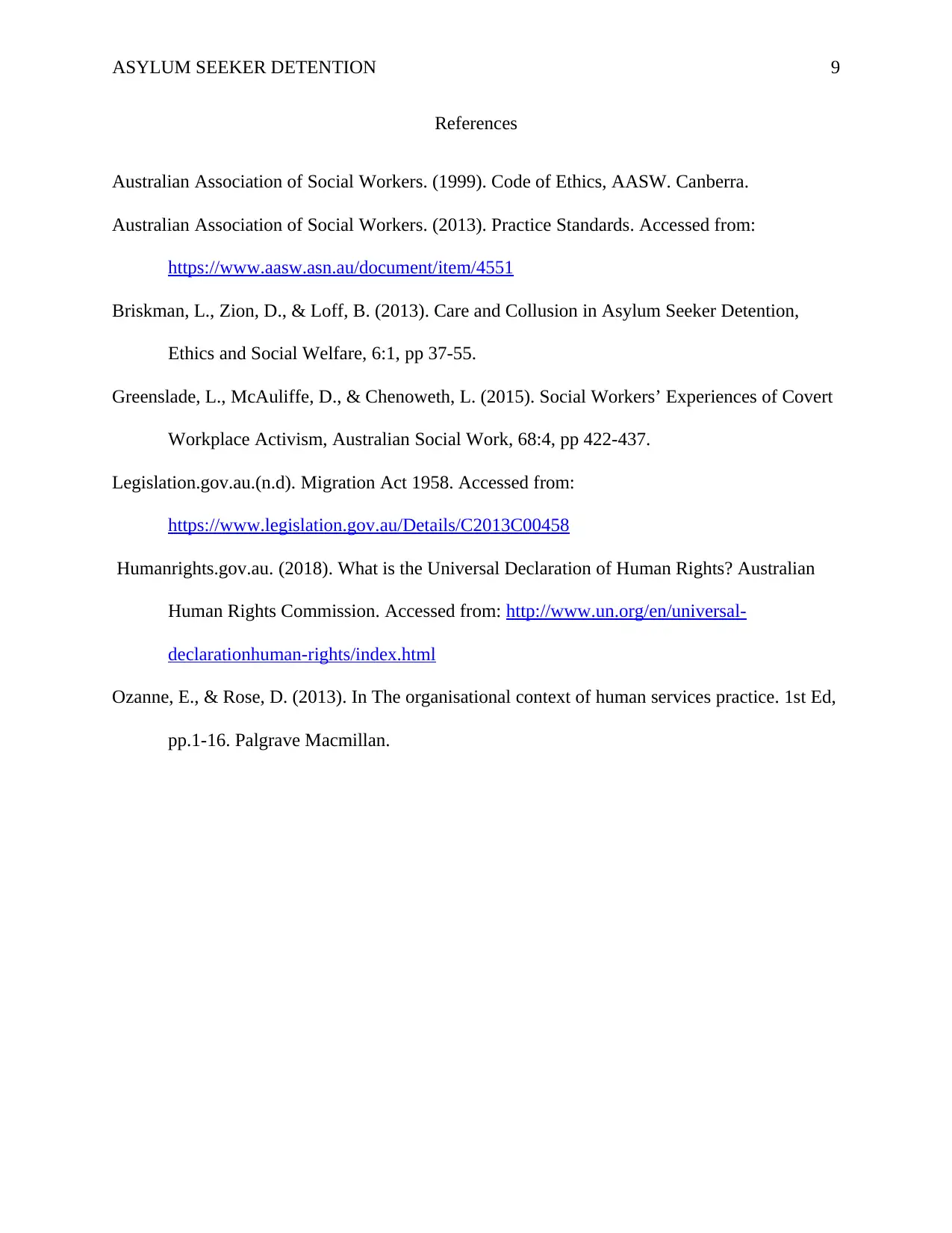
ASYLUM SEEKER DETENTION 9
References
Australian Association of Social Workers. (1999). Code of Ethics, AASW. Canberra.
Australian Association of Social Workers. (2013). Practice Standards. Accessed from:
https://www.aasw.asn.au/document/item/4551
Briskman, L., Zion, D., & Loff, B. (2013). Care and Collusion in Asylum Seeker Detention,
Ethics and Social Welfare, 6:1, pp 37-55.
Greenslade, L., McAuliffe, D., & Chenoweth, L. (2015). Social Workers’ Experiences of Covert
Workplace Activism, Australian Social Work, 68:4, pp 422-437.
Legislation.gov.au.(n.d). Migration Act 1958. Accessed from:
https://www.legislation.gov.au/Details/C2013C00458
Humanrights.gov.au. (2018). What is the Universal Declaration of Human Rights? Australian
Human Rights Commission. Accessed from: http://www.un.org/en/universal-
declarationhuman-rights/index.html
Ozanne, E., & Rose, D. (2013). In The organisational context of human services practice. 1st Ed,
pp.1-16. Palgrave Macmillan.
References
Australian Association of Social Workers. (1999). Code of Ethics, AASW. Canberra.
Australian Association of Social Workers. (2013). Practice Standards. Accessed from:
https://www.aasw.asn.au/document/item/4551
Briskman, L., Zion, D., & Loff, B. (2013). Care and Collusion in Asylum Seeker Detention,
Ethics and Social Welfare, 6:1, pp 37-55.
Greenslade, L., McAuliffe, D., & Chenoweth, L. (2015). Social Workers’ Experiences of Covert
Workplace Activism, Australian Social Work, 68:4, pp 422-437.
Legislation.gov.au.(n.d). Migration Act 1958. Accessed from:
https://www.legislation.gov.au/Details/C2013C00458
Humanrights.gov.au. (2018). What is the Universal Declaration of Human Rights? Australian
Human Rights Commission. Accessed from: http://www.un.org/en/universal-
declarationhuman-rights/index.html
Ozanne, E., & Rose, D. (2013). In The organisational context of human services practice. 1st Ed,
pp.1-16. Palgrave Macmillan.
⊘ This is a preview!⊘
Do you want full access?
Subscribe today to unlock all pages.

Trusted by 1+ million students worldwide
1 out of 9
Your All-in-One AI-Powered Toolkit for Academic Success.
+13062052269
info@desklib.com
Available 24*7 on WhatsApp / Email
![[object Object]](/_next/static/media/star-bottom.7253800d.svg)
Unlock your academic potential
Copyright © 2020–2026 A2Z Services. All Rights Reserved. Developed and managed by ZUCOL.